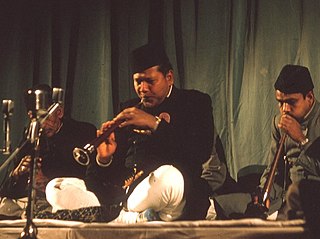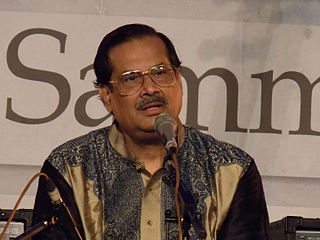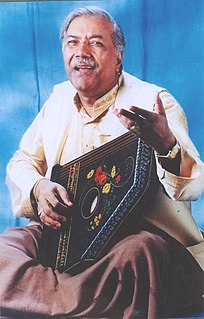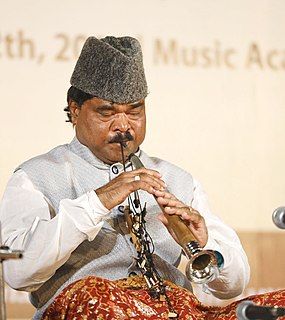
Ustad Alla Rakha Qureshi, popularly known as Alla Rakha, was an Indian tabla player who specialized in Hindustani classical music. He was a frequent accompanist of sitar player Pandit Ravi Shankar and was largely responsible for introducing Tabla to the western audience.

Hariprasad Chaurasia is an Indian music director and classical flautist, who plays the flute, in the Hindustani classical tradition.

Pandit Jasraj was an Indian classical vocalist, belonging to the Mewati gharana. His musical career spanned 75 years resulting in national and international fame, respect and numerous major awards and accolades. His legacy includes memorable performances of classical and semi-classical vocal music, classical and devotional music, albums and film soundtracks, innovations in various genres including Haveli Sangeeth and popularizing the Mewati Gharana - a school of thought in Hindustani classical music. Pandit Jasraj taught music to amateur and professional students in India, Europe, Canada and the United States.

Pandit Shivkumar Sharma was an Indian classical musician and santoor player who is credited with adapting the santoor for Indian classical music. As a music composer he collaborated with Indian flautist Hariprasad Chaurasia under the collaborative name Shiv–Hari and composed music for many Indian films including Faasle (1985), Chandni (1989), and Lamhe (1991).

Bismillah Khan, often referred to by the title Ustad, was an Indian musician credited with popularizing the shehnai, a reeded woodwind instrument. While the shehnai had long held importance as a folk instrument played primarily schooled in traditional ceremonies, Khan is credited with elevating its status and bringing it to the concert stage.

Pandit Ajoy Chakrabarty is an Indian Hindustani classical vocalist, composer, lyricist and gurudev of the Patiala-Kasur gharana. He is considered to be one of the proverbial figures of Indian classical music. He has also dominated for other major classical genres of India especially—Indore, Delhi, Jaipur, Gwalior, Agra, Kirana, Rampur and even Carnatic music in South India. He was given Padma Bhushan Award, the third highest civilian award in India in 2020.

Ganesh Balawant Nawathe, better known as Pandit Jitendra Abhisheki, was an Indian vocalist, composer and scholar of Indian classical, semi-classical, and devotional music. While he distinguished himself in Hindustani music, he is also credited for the revival of the Marathi musical theatre in the 1960s. Jitendra Abhisheki has been praised as being "among the stalwarts of Hindustani classical music who mastered other musical forms such as thumri, tappa, bhajan, and bhavgeet. His work in Marathi natyasangeet is well-known."

Bhajan Sopori is an Indian instrumentalist. He is a player of the santoor, an ancient stringed musical instrument. On the occasion of 67th Indian Republic Day 2016, Pandit Bhajan Sopori was accorded Jammu and Kashmir State lifetime achievement award.

Ustad Rashid Khan is an Indian classical musician in the Hindustani music tradition. He belongs to the Rampur-Sahaswan gharana, and is the great-grandson of gharana founder Inayat Hussain Khan. He is married to Soma Khan.
Vishnu Govind Jog, better known as V. G. Jog, was an Indian violinist. He was the foremost exponent of the violin in the Hindustani music tradition in the 20th century, and is credited for introducing this instrument into Hindustani music.

Ram Narayan, often referred to with the title Pandit, is an Indian musician who popularised the bowed instrument sarangi as a solo concert instrument in Hindustani classical music and became the first internationally successful sarangi player.
Pandit Motiram Pandit Maniram Sangeet Samaroh is an annual Indian classical music festival held at Chowmahalla Palace in Hyderabad, India. The festival is organised by noted classical singer Pt. Jasraj in memory of his father and brother, both classical musicians. Jasraj always performs on 30 November every year, his father's death anniversary and a tribute to Jasraj’s guru, his mentor and elder brother, Maniram, who died in 1986, and Jasraj renamed the festival to include his brother's name.

Taalyogi Pandit Suresh Talwalkar is an Indian musician who plays the percussion instrument tabla.

Ustad Ghulam Mustafa Khan was an Indian classical musician in the Hindustani classical music tradition, belonging to the Rampur-Sahaswan Gharana.

Pandit M. Venkatesh Kumar is an Indian Hindustani vocalist. He is best known for his rendition of devotional songs composed by Swami Haridas.

Pandit Dr. S. Ballesh, born Ballappa Sanna Bharamappa Bhajantri and also known as S. Ballesh Bhajantri on 1 April 1958) is an Indian classical Hindustani shehnai player. One of the most well-known disciples of shehnai player Bharat Ratna Ustad Bismillah Khan, he is an expert in Benares gharana shehnai playing, and a Patiala gharana Hindustani vocalist, ghazal singer, Indian Playback singer and musician, often referred by the title Panditji and BadeGuruji. Ballesh is credited with popularizing the shehnai, a reeded woodwind instrument. While the shehnai had long held importance as a folk instrument played in traditional ceremonies in India, Ballesh is credited with elevating its status and bringing it back to the centre stage. He plays often for Prasar Bharati's All India Radio (AIR) and Doordarshan.
Moinuddin Khan is a veteran Indian classical instrumentalist and vocalist, who plays sarangi. Based in Jaipur, he belongs to the "Jaipur gharana" of Hindustani classical music.
Sakar Khan (1938–2013) was an Indian musician, considered by many as the greatest exponent of the Kamayacha, a Rajasthani version of the Persian musical instrument of the same name, popular among the Manganiar community of the Indian desert state. The Government of India honoured Khan in 2012, with the fourth highest civilian award of Padma Shri.
Gaan Maharishi Pt. Krishnarao Shankar Pandit (1893–1989) was an Indian musician, considered by many as one of the leading vocalists of the Gwalior gharana. He authored several articles and 8 books on music and was the founder of Shankar Gandharva Mahavidyalaya, a music college based in Gwalior. The Government of India awarded him the third highest civilian honour of the Padma Bhushan, in 1973, for his contributions to music. He was also a recipient of several other honors, including the 1959 Sangeet Natak Akademi Award and the 1980 Tansen Award of the Government of Madhya Pradesh.
Pandit Nikhil Jyoti Ghosh was an Indian musician, teacher and writer, known his proficiency on the percussion instrument of tabla. He founded Sangit Mahabharati, an institution of music in 1956, and performed on various stages in India and abroad. A recipient of the Ustad Hafiz Ali Khan Award, his style was known to have been aligned with the Delhi, Ajrada, Farukhabad, Lucknow and Punjab gharanas of music. The Government of India awarded him the third highest civilian honour of the Padma Bhushan, in 1990, for his contributions to Music.















